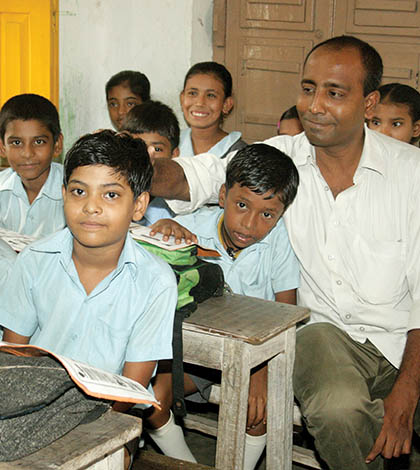
 Having been forced to quit education at an early age due to financial constraints, Mamoon Akhtar and his NGO – Samaritan Help Mission – today educate thousands of underprivileged children in the Tikiapara slums of Howrah
Having been forced to quit education at an early age due to financial constraints, Mamoon Akhtar and his NGO – Samaritan Help Mission – today educate thousands of underprivileged children in the Tikiapara slums of Howrah
This is one story that never ceases to inspire. Away from the glitz and hustle of Kolkata, one of India’s busiest and most crowded metropolitan cities, this is a soul-stirring story of one individual who, despite all odds, strives to bring change to the lives of children in a ghetto who would otherwise have had no future.
It all began on September 22, 1970, with the birth of Mamoon Akhtar in the slums of Tikiapara, Howrah. Born to a father who worked as a labourer at a fabrication workshop, Mamoon was pulled out of school in the seventh stan- dard after his father lost his job and his parents could no longer afford his school fees. Mamoon, however, was determined to not let his circumstances govern his life. He took up a part-time job when he was 14 years of age to support his education and managed to study till the twelfth standard, before landing a job as a librarian at a private school. With the help of this job, Mamoon managed to support his family of four sisters and by then, a widowed mother.
Needless to say, circumstances had been extremely challenging for him, especially considering that his left hand was affected with polio since childhood. Mamoon, however, not only took his own life challenges in his stride, but also resolved to help the children who face challenges similar to his own. The con- dition of the poor children in his slum moved him. Children in Tikiapara slum were either forced to sell drugs and illicit liquor or get involved in other nefarious activities by anti-social elements of the locality. Many a times, it is the parents who forced their children into drug trade for their daily bread. Taking them on would never have been easy. Howev- er, Mamoon believed that he could pro- tect these children if he could help them get educated.
It was with this idea that he estab- lished the Samaritan Help Mission (SHM) in 2001 and set up a small non- formal school in his ancestral house of 600 sq ft. What began with a modest number of six students is today recog- nised as a movement of education for the poor. Recognised by the West Ben- gal Board of Secondary Education, the small school now has 1,820 students and runs as a quality English medium institution for children of rickshaw- pullers, orphans, children with fathers in jail or whose mothers work as house- maids, and for all those who have no hope for a better future.
Despite functioning in a largely Mus- lim dominated locality, Mamoon does not differentiate between kids based on their religion and firmly believes in the idea of secular education. Helping peo- ple on need and not creed is his motto. From a humble start around 14 years ago, Mamoon’s SHM has definitely come a long way. Today, the school includes classes from kindergarten to the seventh standard, with classes being upgraded every year.
Since its inception, SHM has spread its roots to helping not just children but also their parents. It has established a vocational training-cum-income gen- eration programme for the poor women in the slum to protect them from exploi- tation. About 200 women are trained and employed in the unorganised sec- tor annually through this initiative. The Health Centers and Mobile Medi- cal Units of SHM help treat about 600 patients on a daily basis. Mamoon’s efforts have also expanded to bring- ing banking services to the poor. The SHM has started a Kiosk Banking Ser- vice jointly with Indian Overseas Bank and Bank of Baroda to cover the poor unorganised labourers and commu- nity people. This part of the populace is marked as the unbanked population of Tikiapara and is thus, an easy target for chit funds. Over 2,000 women are currently covered under the umbrella of SHM’s banking services.
SHM’s other programmes include the Family Programme that began in 2002 to support the poor elderly who were abandoned by their children with monthly rations. 350 families get regu- lar support under this programme. SHM’s ambit has expanded further to include vocational training, retail train- ing, smart industrial tailoring and other skill development trainings and place- ments for the unemployed youth. The efforts have started to bear fruit and a total of 450 youngsters have already been placed in the organised sector. The target, however, is to place 2,000 every year through training and place- ment. Among other measures, SHM is implementing a Social Security Scheme amongst the unorganised labourers in collaboration with the Ministry of Labour, Government of West Bengal and is also working with the JRD Tata Trust under its ITE Elementary Educa- tion Project to turn defunct government schools functional through the intro- duction of modern systems and infor- mation technology.
“Despite functioning in a largely Muslim dominated locality, Mamoon does not differentiate between kids based on their religion and firmly believes in the idea of secular education”
Over the years, Mamoon has covered huge ground and his efforts have acted as an inspiration for many. We often hear about policies and welfare mea- sures by the government not reaching their intended beneficiaries. The people whose lives Mamoon seeks to change have remained unchanged for gen- erations. Bringing them into the main- stream is a task that requires patience, courage and conviction. And Mamoon is in no mood to give up.


















